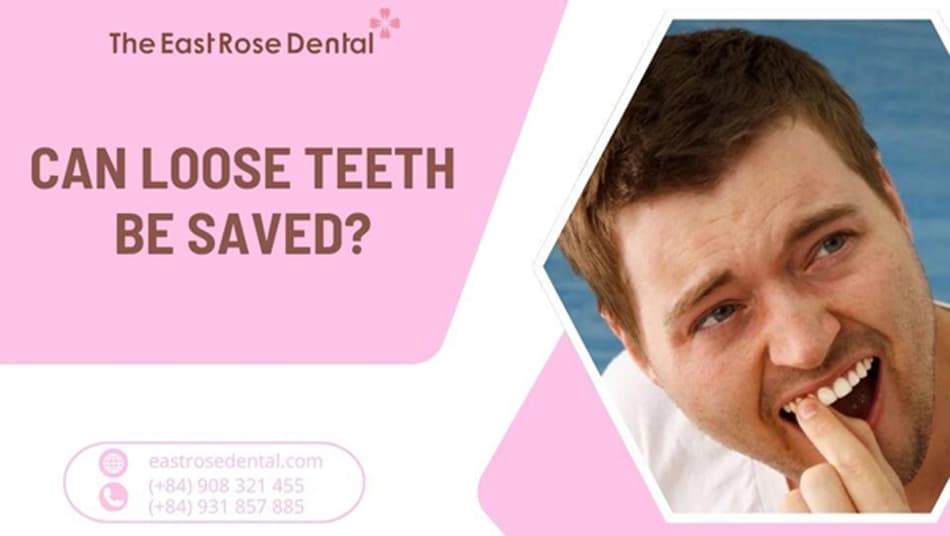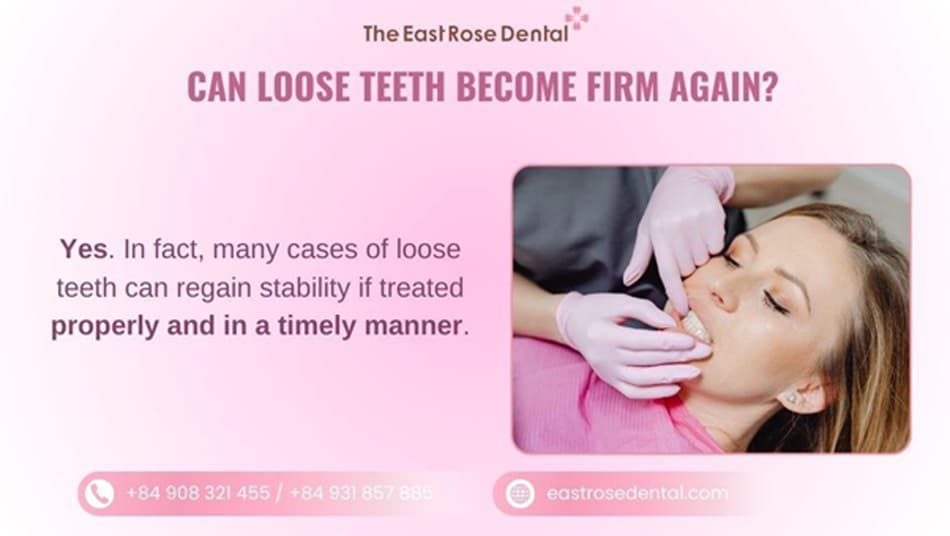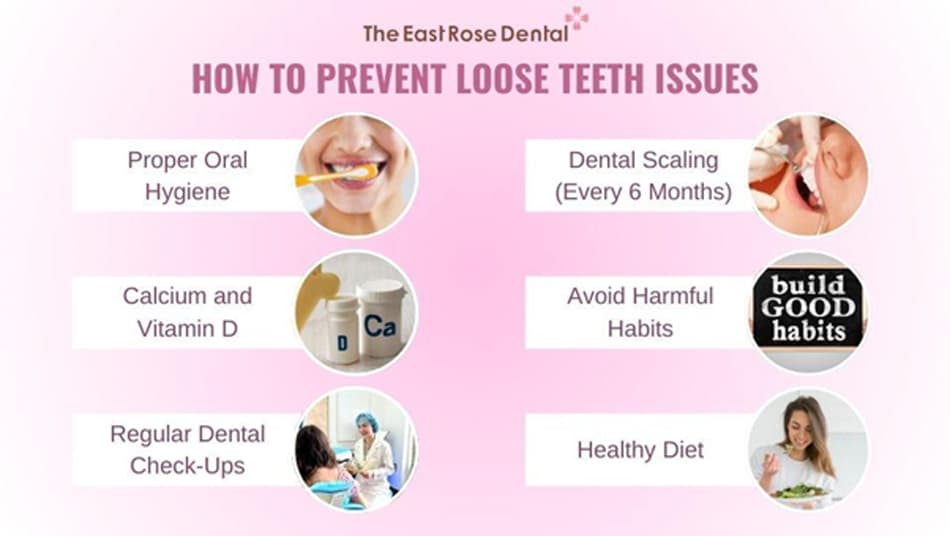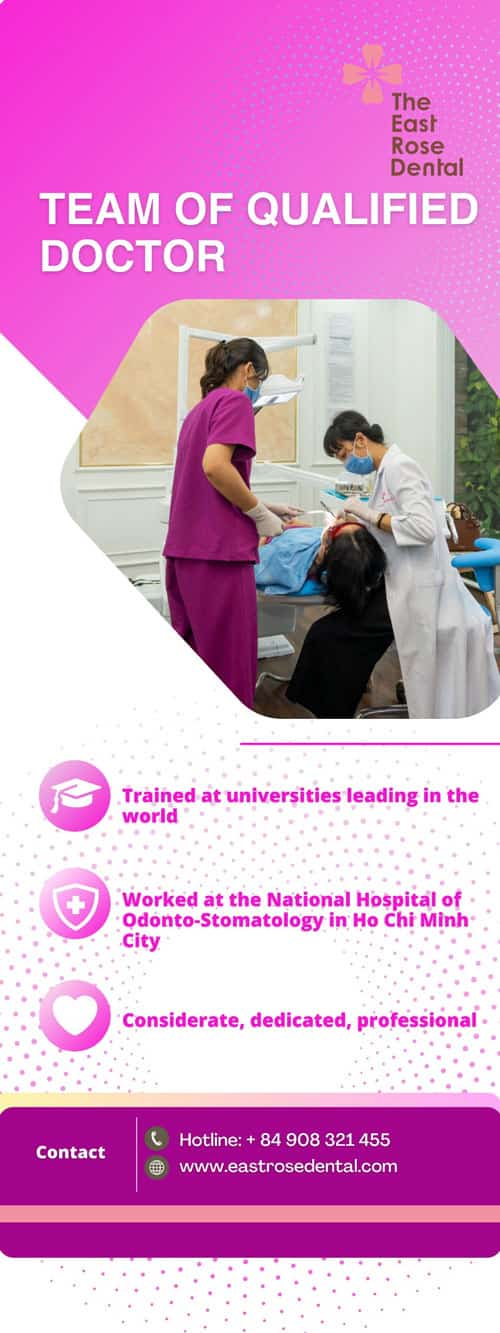Can loose teeth be saved? Effective and lasting solutions
Loose teeth can be a warning sign of several serious oral health issues, ranging from gingivitis to alveolar bone loss. Many people wonder whether loose teeth can become stable again. In the following article, The East Rose Dental Clinic will help you better understand the causes, available treatment options, and effective prevention methods for this condition.

7 Main Causes of Loose Teeth
Loose teeth are not an uncommon occurrence, but they are often underestimated until the condition worsens. Accurately identifying the cause is the first step in choosing the appropriate treatment and preventing the risk of permanent tooth loss.
Periodontal Disease Destroys the Tooth-Supporting Structure
Periodontal disease is an advanced stage of gingivitis, occurring when poor oral hygiene causes bacteria to accumulate beneath the gumline, leading to deep inflammation in the connective tissue and alveolar bone. This process results in bone loss and the destruction of the periodontal ligament, which holds the teeth firmly in place within the jawbone. When the ligament is damaged, the teeth lose their stable support, leading to looseness and potential tooth loss if not treated promptly.
Alveolar Bone Resorption Due to Prolonged Tooth Loss
When a tooth is lost and not promptly replaced with a bridge, denture, or implant, the alveolar bone in that area begins to resorb due to the absence of chewing forces. The bone loss progresses, affecting neighboring teeth, weakening the bone structure, and causing the remaining teeth to lose their support, gradually becoming loose. This is a silent yet dangerous process that requires intervention through bone grafting or early implant placement.
Teeth Grinding or Jaw Clenching During Sleep Causes Loose Teeth
Bruxism, or teeth grinding during sleep, is a common yet often overlooked cause of loose teeth. The continuous, uncontrolled force exerted at night generates pressure much greater than normal chewing forces. Over time, this pressure damages the periodontal ligament, leads to temporomandibular joint (TMJ) disorders, and causes teeth to become loose. Bruxism can even result in enamel fractures, wear on the tooth necks, and reduce the lifespan of restorations such as crowns or implants.
Impact from Trauma or Blows
Strong blows to the mouth area, such as those from traffic accidents, sports, or biting on hard objects, can cause immediate damage to the periodontal tissues. Additionally, long-term malocclusion can lead to bite trauma, a condition where chewing forces are unevenly distributed, causing certain teeth to become overloaded. Both types of trauma affect the periodontal ligaments and alveolar bone, resulting in loose teeth or teeth shifting out of place.
Systemic Diseases Affecting Periodontal Tissues
Certain systemic diseases, such as diabetes, osteoporosis, or immunodeficiency, can directly impact the periodontal tissues and jawbone. For instance, in uncontrolled diabetes, high blood glucose levels create an environment conducive to the growth of bacteria that cause periodontal inflammation. Additionally, impaired healing ability hampers the recovery of gum and bone damage, leading to rapid bone resorption and loose teeth.
Age-related Factors
As individuals enter middle age and beyond, the cell regeneration process in the body, including in the periodontal tissues and jawbone, begins to slow down. Bone mineral density decreases, causing the alveolar bone to become more porous and prone to resorption. Additionally, the gums tend to recede, exposing the tooth roots and diminishing their anchorage. This is why teeth in older adults often become loose, even without direct trauma or noticeable cavities.
Pregnancy and Oral Health
During pregnancy, the significant increase in estrogen and progesterone hormones alters the body’s inflammatory response, particularly in the gum tissues. The gums become more sensitive, prone to inflammation, swelling, and bleeding, providing an environment conducive to the growth of periodontal bacteria. Prolonged conditions can damage the periodontal ligament and alveolar bone, leading to loose teeth.
Can Loose Teeth Be Restored?

Loose teeth do not necessarily require extraction. In fact, many cases can see teeth restored to their original stability with proper and timely intervention. However, the ability to restore a tooth depends on the underlying cause of the looseness and the extent of damage to the surrounding tissues. Specifically:
Loose Teeth Due to Oral Health Issues
The most common causes are gingivitis, periodontitis, or long-term tartar accumulation. These conditions damage the periodontal ligaments and lead to alveolar bone resorption. If detected in the early stages, treatments such as scaling, periodontal therapy, deep cleaning beneath the gums, anti-inflammatory medication, and splinting can help restore the periodontal tissues and stabilize the teeth. However, in more advanced stages, the chances of recovery are low, and extraction may become necessary.
Loose Teeth Due to Alveolar Bone Resorption
If the bone loss is mild, it can be treated with bone regeneration, tissue grafting, or splinting. However, if the bone resorption is extensive, the chances of recovery are low, and an implant or bridge may be necessary. It's important to consult a dentist as soon as possible to avoid tooth loss or other unnecessary complications.
Loose Teeth Due to Hormonal Changes or Aging
Pregnant women, those going through menopause, or older adults often experience loose teeth due to hormonal changes or the natural aging process. For pregnant women, teeth can regain stability with proper oral care, regular safe scaling during pregnancy, and mild antibacterial mouthwash. However, in older adults, decreased bone density and weakened tissues around the teeth make full recovery difficult. Treatment may include splinting, periodontal therapy, calcium and vitamin D supplementation, or bone grafting if there is significant bone loss.
Trauma or Bruxism Cases
Teeth that are subjected to a strong impact, prolonged grinding, or malocclusion can become loose without causing periodontal damage. In these cases, the dentist may splint the teeth, adjust the bite, or use a night guard to allow the surrounding tissues time to heal. With timely and appropriate treatment, the teeth often regain their original stability.
How to Prevent Loose Teeth

Loose teeth not only affect chewing but also serve as a warning sign of serious oral health problems. To prevent this condition, it's important to proactively care for and protect your dental health from an early stage with the following measures:
- Proper Oral Hygiene: Brush your teeth at least twice a day with a soft-bristled toothbrush, use fluoride toothpaste, and incorporate flossing and antibacterial mouthwash to thoroughly remove plaque.
- Regular Scaling Every 6 Months: Tartar buildup is a major cause of gingivitis, periodontitis, and loose teeth. Regular scaling helps prevent these issues early.
- Maintain a Diet Rich in Calcium and Vitamin D: These nutrients are essential for maintaining healthy jawbones and surrounding tissues, improving tooth stability. Prioritize foods like milk, salmon, almonds, and leafy greens.
- Avoid Bad Habits: Refrain from grinding your teeth at night, using your teeth to bite hard objects, or opening bottle caps, as these habits can damage the structures supporting your teeth.
- Regular Dental Check-ups: Early detection of oral health issues enables timely treatment, preventing complications that can lead to loose teeth or tooth loss.
Loose teeth can be treated if detected and addressed promptly. Regular dental check-ups and maintaining proper oral hygiene habits are crucial for keeping your teeth strong and healthy. If you're experiencing loose teeth, don't hesitate—visit The East Rose Dental Clinic for expert consultation and effective treatment.
Services
Working Time
- Monday - Friday: 08:00 - 19:00
- Saturday: 08:00 - 18:00
- Sunday closed
Contact Info
- Hotline 1: 1900 585 874
- Hotline 2: (+84)838 258 778
- Mobile: (+84)908 321 455
- Phone: (+84)2 838 258 778
- info@dentalrose.net
- rosedentalclinicvn@gmail.com
 English
English  Tiếng Việt
Tiếng Việt

